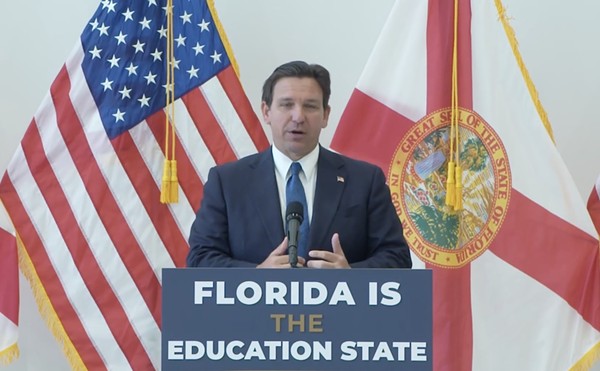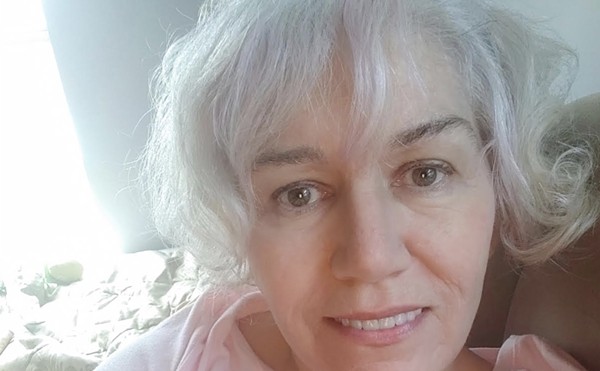The October 2004 arrest of then-25-year-old Mackle Shelton by an Osceola County Sheriff in a Winn-Dixie parking lot for selling crack cocaine didn’t immediately fit the bill for a landmark constitutional challenge, at least not on the surface. Shelton, after all, had a history of drug convictions prior to this particular brush with the law, and in his attempt to escape arrest, Shelton was actually shot in the shoulder by a sheriff’s agent in pursuit. He was convicted and sentenced to 18 years in prison in 2005 by a jury that, because of a 2002 law enacted by the Florida Legislature under the no-tolerance regime of Gov. Jeb Bush, was not instructed to consider Mackle’s intent. That law removed mens rea – or “guilty mind” – from the equation in drug cases, shifting the burden of proof onto the defendant. If you had drugs on you, you knew what you were doing.
On July 27, federal Judge Mary Scriven ruled in an Orlando court, via a scathing 43-page order, that at least the drug-related portion of Shelton’s verdict be thrown out, because, in no uncertain terms, Florida’s drug statute is an unconstitutional “legislative scheme.” Florida, it should be noted, is the only state with laws on its books omitting the intent clause from felony cases.
Because the law “imposes harsh penalties, gravely besmirches an individual’s reputation and regulates and punishes otherwise innocuous conduct without proof of knowledge or other criminal intent,” Scriven wrote, “the court finds it violates the due process clause and that the statute is unconstitutional on its face.”
It’s a strong statement nearly a decade in the making, one that could reverse innumerable previous drug convictions handed down since the law passed and affect the way drug cases are handled moving forward. Though the decision may not yet be binding – it will inevitably be appealed by the state – it’s a victory for the American Civil Liberties Union, the National Association of Criminal Defense Lawyers and the many law professors who petitioned the court on the matter.
“The attempt to remove knowledge of criminal conduct from drug law enforcement underscores the problems that arise when politicians make laws based on bravado instead of justice,” ACLU of Florida executive director Howard Simon writes in an email.
The roots of Florida HB 1935 (and its resulting statute, FS 893.101) are directly linked to another local case from 1996, Chicone v. State. Jerry J. Chicone III, the grandson of a prominent citrus magnate, was convicted of a third-degree felony for possession of cocaine. The Florida Supreme Court ruled that the trial court did not provide the jury proper instructions with regard to mens rea and ruled in favor of Chicone.
That move exacerbated an already tenuous relationship between the legislature and the judiciary, setting the stage for a legislative bypass of constitutional law. To wit: “The legislature finds that knowledge of the illicit nature of a controlled substance is not an element of any offense under this chapter,” the companion Senate bill read. “Lack of knowledge of the illicit nature of a controlled substance is an affirmative defense to the offenses of this chapter.” In other words, the defense could try to prove its client didn’t know the nature of the substance against the state’s presumption that the client did know.
“To be clear, this bold move, which is virtually unheard of in American law, subjects innocent actors to penalties that in some circumstances can include life imprisonment,” the National Association of Criminal Defense Lawyers argued in its Champion magazine earlier this year.
Judge Scriven’s decision validates that opinion, but leaves as many questions as it does answers. It’s a federal decision that could be taken up by the Florida Supreme Court (thus binding it in all Florida courts) or in an appeal to the 11th Circuit United States Court of Appeals in Atlanta.
“The thing that’s a sandspur in everybody’s sock is whether they also find state constitutional grounds,” Ninth Judicial Circuit public defender Bob Wesley says, adding, “You bet we are going to use it.”
Wesley doesn’t see it as a magic bullet likely to free many of the state’s nearly 20,000 incarcerated drug offenders, but more as a “persuasive” piece of the defense puzzle.
“I think for a lot of people, the issue may be not so much do they get relief automatically, because I don’t think the [mens rea] issue was raised,” he says. “I think it may be a new bite at the apple for people to say, ‘My no-good lawyer failed to raise it.’”
The State Attorney’s office did not return calls for this story.
Local attorney Steve Mason is a little more optimistic. “It potentially means that every case that’s in the pipeline – meaning right now you were charged, or you were convicted in the past – every case is potentially subject to vacation and dismissal,” he says.
But that mass vacation will probably have to wait, according to Florida Department of Corrections spokeswoman Jo Ellyn Rackleff.
“We are not involved with the lawmaking,” she says. “We just carry out the laws of Florida. And this will probably be appealed. We’ll wait for direction from the state legislature.”
Shelton Habeas Order
















